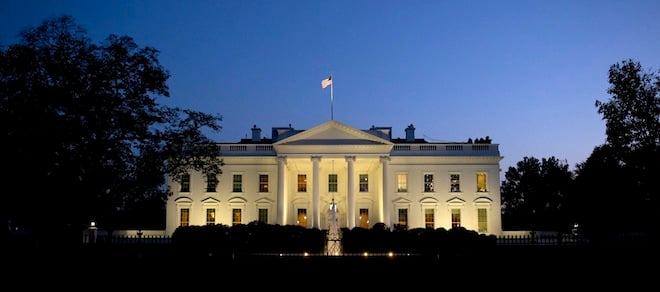The huge secret about FDR’s death
Americans were told their president died of a sudden stroke. Not true, says a new book.
A U.S. flag decorates a for-sale sign at a home in the Capitol Hill neighborhood of Washington, August 21, 2012. President Barack Obama said on Monday the U.S. housing market was “beginning to tick up” but was still not where it needs to be. REUTERS/Jonathan Ernst (UNITED STATES – Tags: BUSINESS REAL ESTATE)
Share
Dwight Eisenhower’s heart attack, LBJ’s gallbladder, Kennedy’s many ailments, even George Bush Sr.’s bout of nausea in Japan: ever since the occupant of the White House became the Most Powerful Man in the World, the health of U.S. presidents has been of consuming interest. Much of that concern is pure finger-on-the-nuclear-button angst, but a significant portion derives from the fate of president Franklin Delano Roosevelt.
When the first leader of superpower America died in office in 1945, it was a shock to most of his countrymen, who were largely unaware of just how sick FDR was. In fact, according to neurologist Steven Lomazow and journalist Eric Fettmann, authors of FDR’s Deadly Secret, they are the first to crack wide open the secrecy that has shrouded Roosevelt’s health until now. FDR, they write, died of cancer, a disease that had deleterious effects on his mental as well as physical health. In concealing the cancer from the American people, the authors argue, Roosevelt was “rolling the dice with history”: he won (mostly), but it was a very close run.
By the time his health began seriously declining in the 1940s, Roosevelt was long accustomed to disguising his disability. At 39, 11 years before he was first elected president in 1932, polio left the ambitious politician paralyzed for life from the waist down. FDR took care never to let it show in public. He used a wheelchair in private, but before crowds walked with the help of five-kilogram iron braces fitted to his hips and legs, and he had hand controls in his cars so he could be seen driving. Voters never noticed—or, pinning their hopes on Roosevelt through catastrophic depression and the greatest war in history, never wanted to see—the stage management. During the 1944 campaign, caught in a New York parade during a persistent rainstorm, the president’s open car was several times whisked out of the cavalcade and into a heated garage. Secret Service agents would stretch Roosevelt out on blankets laid on the garage floor, remove all his clothes, towel him dry and rub him down; re-dressed in dry clothes and fortified with a shot of brandy, FDR was soon back in the downpour.
Roosevelt’s health was thus never an election issue, and his physicians’ explanation of his sudden death—caused, in their words, by “a bolt out of the blue,” a massive and unforeseeable stroke brought on by overwork—was accepted by Americans. Even at the time, though, privileged observers, like prime minister William Lyon Mackenzie King and Churchill’s personal physician, Lord Moran—both of whom recorded their shock at FDR’s appearance months before his death—knew better. In 1970, Howard Bruenn, Roosevelt’s last surviving doctor, finally admitted his patient had been fighting severe heart disease throughout 1944 and 1945.
But that still isn’t the whole story, according to Lomazow and Fettmann. They maintain FDR died from melanoma, malignant skin cancer that metastasized from his forehead to his brain, causing his fatal stroke. The brain cancer diagnosis fits better than heart trouble with the fact that the likes of King and Moran were even more shocked by the president’s sometimes rambling mental state than by his appearance. But the authors’ best evidence lies in photos, including their book’s cover image, that show a lesion over FDR’s left eyebrow. The photos date from 1923 on, and the once tiny spot steadily grows through the Depression before disappearing in 1940, probably through surgery.
Since FDR’s medical records went missing after his death (a fact suspicious in itself), the case will never be conclusive. But Lomazow and Fettmann are right that this ancient history matters. It raises anew the moral argument over whether a political leader has any right to medical privacy. If Roosevelt really did have an eyebrow lesion surgically removed in 1940, he would have known then, even before the U.S. entered the Second World War, that he had scant years to live. FDR may genuinely have believed he was still the best man to win the war—and who can gainsay him that?—but he chose not to let the voters decide. And for a man with limited life expectancy, Roosevelt was cavalier about his vice-presidents, picking them for domestic political reasons, not by who was best suited to lead in dangerous times. That the untested Harry Truman turned out, in the judgment of historians, to have been an exceptional successor, was more a matter of luck than of FDR’s foresight. Rolling the dice, indeed.
